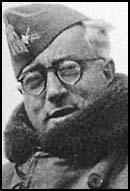Juan Yague

Juan Yagüe, the son of a doctor, was born in Spain in 1891. He entered the Infantry Academy of Toledo where he met Francisco Franco. The two men were commissioned at the same time and served together in Africa.
In 1932 Yagüe was promoted to the rank of lieutenant colonel of a infantry battalion in Spain. Two years later he joined Franco in the suppression of the left-wing uprising in Asturias. At this time he became very closely associated with the Falange Española.
The Popular Front came to power in February 1936. The new government immediately upset the conservatives by releasing all left-wing political prisoners. The government also introduced agrarian reforms that penalized the landed aristocracy. Other measures included transferring right-wing military leaders such as Francisco Franco to posts outside Spain, outlawing the Falange Española and granting Catalonia political and administrative autonomy.
As a result of these measures the wealthy took vast sums of capital out of the country. This created an economic crisis and the value of the peseta declined which damaged trade and tourism. With prices rising workers demanded higher wages. This led to a series of strikes in Spain.
On the 10th May 1936 the conservative Niceto Alcala Zamora was ousted as president and replaced by the left-wing Manuel Azaña. Soon afterwards Spanish Army officers, including Yagüe, Emilio Mola, Francisco Franco, Gonzalo Queipo de Llano and José Sanjurjo, began plotting to overthrow the Popular Front government. This resulted in the outbreak of the Spanish Civil War on 17th July, 1936.
Yagüe and his troops seized Merida. On 14th August 1936 Yagüe and 3,000 troops attacked Badajoz. Bitter street fighting took place when the Nationalist Army entered the city. Losses were heavy on both sides and when the Nationalists took control of Badajoz it was claimed they massacred around 1,800 people. He also encouraged his troops to rape supporters of the Popular Front government. As a result Yagüe became known as "The Butcher of Badajoz".
Yagüe then turned his forces towards Madrid, capturing Trujillo, Navalmoral de la Mata and Talavera. In November 1936 he was given command of African forces but was unable to capture the capital. He now took part in the Aragón offensive and took control of Belchite, Caspe and Lérida. He also played a leading role in the victory at Ebro River.
After the defeat of the Republican Army, General Francisco Franco appointed Yagüe as Minister of Air. Juan Yagüe died on 29th October, 1952.

